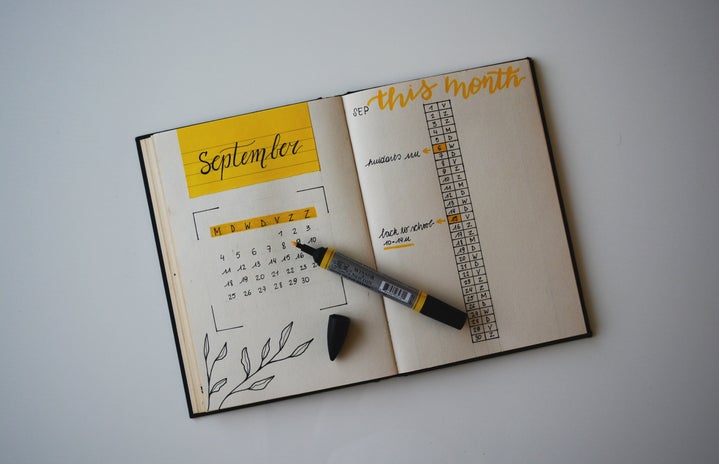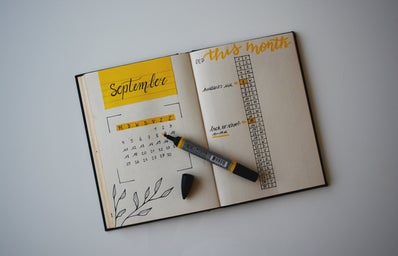Journaling is something that can seem very daunting to those who have never done it. The stereotypical version of journaling is this gargantuan page of deep emotions and expletives about one’s daily life. This image almost always includes some exaggeration of unrequited love, mostly because journaling is most associated with keeping a diary. Most of us grew up consuming media like The Princess Diaries, The Carrie Diaries and The Vampire Diaries, all of which are about a young girl pouring her heart out into a diary. Aside from this media having ‘diaries’ in the title, they all are, at their core, about a girl’s journey through sex and/or love. But journaling is so much more than that, and depending on your reason for using this outlet, it can look very different from person to person.
Journaling can have a variety of different purposes, as well as a variety of aesthetics. How you choose to incorporate journaling in your life can have an impact on what yours may aesthetically look like. Below you can find a variety of different ways to incorporate this great outlet into your daily life as well as some tips and tricks to stay on top of it!
- set one time aside to journal every day
-
Setting even as little as five minutes aside every day can make a HUGE difference in your journaling goals. Getting into a routine is the best way to keep up with healthy habits and continue to build upon the work that you are already documenting. I find it easiest to put a little reminder in my calendar app (I use Google Calendar) so that I get reminded each day to take some time to journal. Depending on your schedule you can allot as much time as you feel you need to journal each day. Conversely, if you feel like you don’t have enough time in the day to journal, try creating a more spread-out schedule like Monday/Wednesday/Friday or Tuesday/Thursday. This way you are still taking the time to jot down a couple of things and create a space just for you!
- don’t worry about the content – just have fun with it!
-
For most people getting into journaling, it can feel like an exaggerated feelings fest. It can be daunting to look at a blank page, much too similar to an assignment, and envision it filled will all of the words you have never let yourself say aloud. Well, good news! It does not have to be like that! If you are getting into journaling to create a safe space for your thoughts and feelings then, by all means, go ahead. But for those trying to ease into it, there are plenty of alternative ways to journal. Lots of people enjoy using a blank bullet journal as a planner, to-do list, feelings tracker, etc. On days that you feel like you don’t have much to say, you can even take a page to doodle; this space truly is your own! At the end of the day, whether you jot things down quickly or take the time to make it beautiful, your journal should reflect YOU.
- Monthly or weekly feelings charts
-
Weekly or monthly feelings charts can be helpful for a variety of reasons. You can use them just for fun, to track your reactions and feelings to certain situations or for health purposes. This can be especially helpful in health contexts if you have recently started a new medication, like birth control, that has the ability to skew some hormonal responses and therefore your reactions to certain situations. Using a tracking system like this can help make sure that this medication is the best fit for you and can be super helpful when referencing instances with your physician. The best way to do this is to draw a weekly or monthly calendar and assign each feeling, emotion or reaction a different color. This can add a little bit of color and fun to your journal, while also giving you a gauge of how your week is going!
Now that you know a little bit about how to journal, let’s get into the ways this healthy habit can benefit you. According to University of Rochester Medical Center, journaling for mental health can help relieve symptoms of anxiety, depression and stress. I recently saw a graphic this past week on Instagram that said “1 of 5 people have a mental illness, but 5 of 5 people have mental health” and that quote really motivated me to write this article. The most important thing about journaling is that it can only add to your life. For me, it helps organize my thoughts, track my moods and let things out. People always say that if practicing good mental health was so easy there would be no mental illness, and while those people are not wrong, it’s also important to practice IMPROVING your mental health. Your mental health journey may not be on a steady incline, it could be a swirling rollercoaster of highs and lows, but journaling can help those slopes feel a little less steep. Taking five minutes to jot a couple of thoughts, feelings or even an emotionally charged doodle can take just a little bit of weight off your shoulders and lead to some more positive experiences. If this helps just one person get through their week, I will have considered this a success! Happy journaling!


